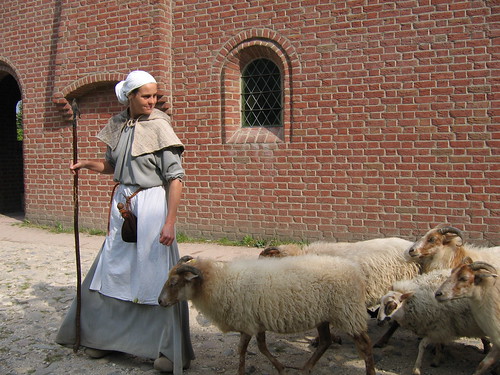
Tuesday in the 4th Week of Easter
Hearing and Heeding the Shepherd
Readings: Acts 11:19-26; Psalm 87:1b-3, 4-5, 6-7; John 10:22-30
Picture: CC hans s
My sheep know my voice; I know them and they follow me…
Today we approach the end of the beautifully inspiring Good Shepherd discourse in the tenth chapter of John’s gospel. In it Jesus has spoken movingly about the Good Shepherd’s relationship with his sheep. He has painted a poignant picture of how the Good Shepherd calls and cares for those entrusted to his care by his Father, even to the extent of laying down his life for them. And, more than once, he has also indicated the distinguishing mark of those who belong to his flock. Recognizing his voice as he calls them by name, they steadfastly follow in his steps. As moving, however, as this metaphor is, we might perhaps ask ourselves what the process looks like in the concrete. How does the Shepherd call his sheep? And how do they listen and respond? Our readings help us to meditate upon these questions by presenting us with two illustrations.
That the so-called Jews in the gospel provide a negative example is clear from the question that they pose to Jesus. In spite of all the signs that he has worked thus far, as well as all the explicit teaching that he has given, they continue to beg him to speak plainly. The Shepherd has been calling his sheep all this time. Quite obviously, these have neither recognized his voice, nor the names by which he calls them. They are too busy with their own respective agendas. They respond to names other than those that the Lord has for them. So, instead of following the Shepherd, they will ultimately reject him. As we will see in the continuation of the reading in the bible, they will even go to the extent of trying to stone him.
In contrast, the situation in the first reading provides us with a positive example of how the shepherd’s voice is heard and heeded. We might begin by first inquiring into the reason why Barnabas was sent to the new Christian community in Antioch. What was he sent there to do? To the more practical-minded and task-oriented among us, the answer seems quite clearly stated in the closing lines of the first reading: for a whole year they met with the Church and taught a large number of people… And yet, should we not be careful also to pay attention to the earlier actions of Barnabas?
Upon arrival in Antioch, the first thing we are told about Barnabas is that he saw the grace of God… He who was sent as a shepherd to the Antiochene flock begins not by teaching but by first listening and recognizing the voice of the Chief Shepherd speaking through and from within his flock. And what does Barnabas hear if not his own true name? For we are told that apart from rejoicing with the people, he also encouraged them all. He was, after all, named Joseph, but called Barnabas, which means son of encouragement (see Acts 4:36). And, having heard the Chief Shepherd calling him by name, Barnabas proceeds to follow in the Shepherd’s steps. Rather than carefully carving out a niche for himself in the community, instead of possessively claiming a portion of the flock for his own, he goes to Tarsus to find Saul. And, together, they minister to the Lord’s sheep in Antioch.
What of us? By what names are we being called? How are we being invited to follow in the steps of the Shepherd today?
Sometimes the immensity of my faith weighs heavy on me. Life is a constant struggle I know, but there is this constant need to check myself, to go against my grain to meet evolving challenges and to grow in imitation of Christ.
ReplyDeleteOftentimes, taking the role of the meek sheep and yet finding it difficult to follow the earthly shepherd; due to my own personal prejudices standing in the way. There are occasions when one finds it hard to be inspired by a humdrum sermon or a lacklustre homily.
At other times, we are required to adopt the role of a minor shepherd ministering as best we can in our limited capacity to those who are in need, trivial issues sometimes. This is the tussle of the dual role I find myself. To heed or be heed. These movements fill up the spaces in my life.
St. Pauls sets the example and we try to emulate Barnabas. To whom do we turn to Lord, you have the message .....
I remember being asked by Fr Iker during a retreat in Chiang Mai: "What is service?" My answer then was, "Service is meeting the needs of others and not their wants or desires". Till this day, however, I'm still not sure where one is supposed to draw the line. How is an unmarried woman supposed to respond when a married and apparently divorced man in her community confides to her a serious health problem and asks her to keep it a secret and not tell the rest of the community? And then hints that he'd would like to get fellowship and support from her? How does one respond when helping a blind man cross the road to get to a bus stop and this man starts to hold her hands and insist that she sing to him, buy him lunch and send him home in a taxi?
ReplyDelete